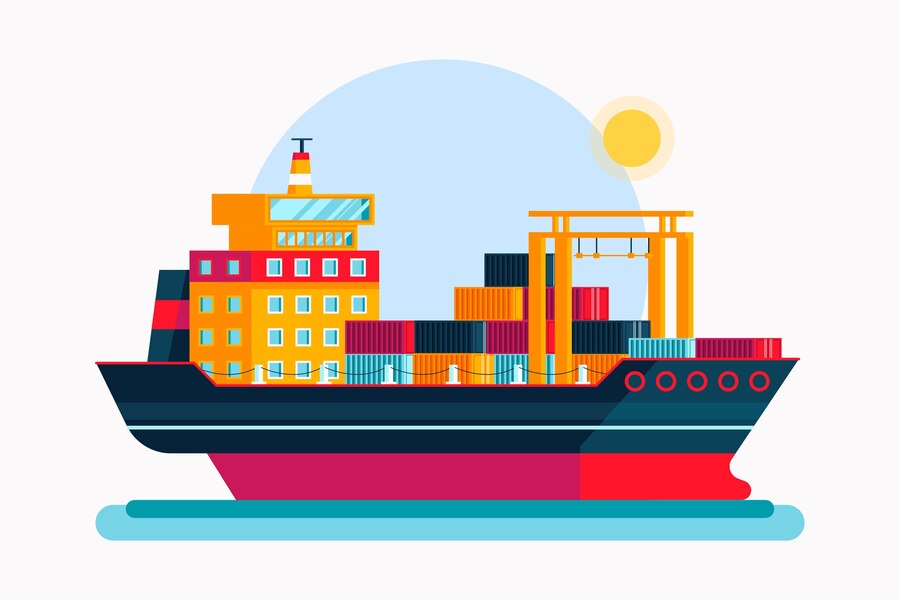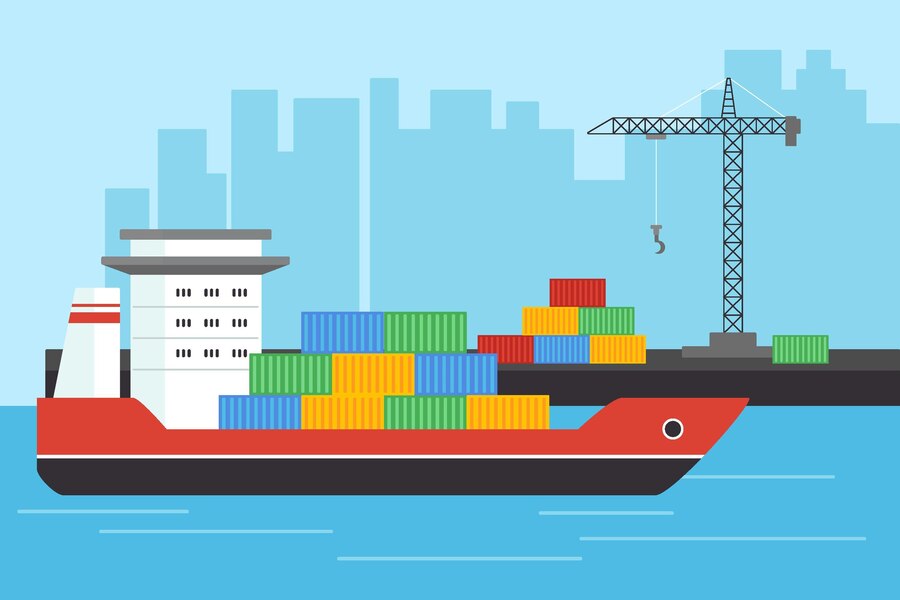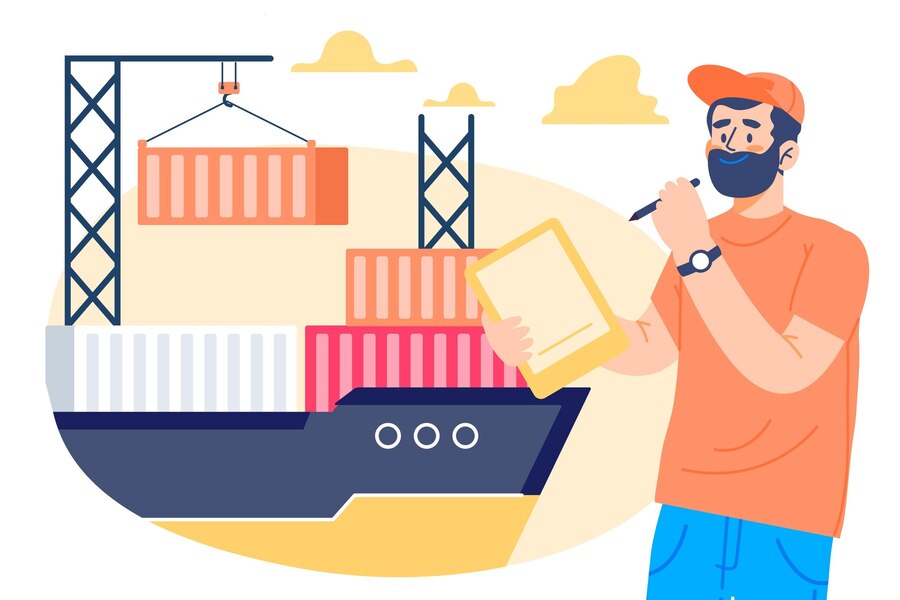GST on Ocean Freight Export Notification: Latest Updates
- 9 Aug 24
- 19 mins

GST on Ocean Freight Export Notification: Latest Updates
Key Takeaways
- Cost Implications: The exemption of GST on ocean freight imports directly leads to reduced operational costs for importers, enhancing the affordability and competitiveness of imported goods in the domestic market.
- Compliance and Documentation: Businesses engaged in importing and exporting goods must maintain accurate records and comply with GST regulations to benefit from exemptions and claim any available refunds.
- Impact on Export Competitiveness: For exporters, understanding and utilizing GST exemptions on ocean freight is crucial for maintaining competitive pricing in international markets.
- Operational Efficiency: The recent regulatory changes encourage operational efficiency by reducing the tax burden on ocean freight, thereby potentially speeding up the logistics process.
- Government Support: The exemption reflects the government's support for trade facilitation and its commitment to simplifying the tax regime for international trade.
Ocean Freight refers to the act of porting goods over the ocean. Try to envision this as an enormous conveyor belt that extends over the oceans and transports everything from cars, clothing, food, and home furnishings from one nation to another. This is the new global trade, with countries able to barter for goods that could not easily be moved by plane or land.
What is GST?
GST stands for Goods and Services Tax. It's like a ticket price that the government charges for the sale of most goods and services. In many countries, including India, GST replaced a maze of previous taxes with a single, more straightforward tax system.
It's designed to make the tax process easier to manage for businesses and to ensure that the government gets its fair share of transactions, whether they're happening in a local market or across global shipping lanes.
What is GST on ocean freight?
In the context of the complexities of the world of international trade, it is important for exporters to inform themselves well regarding refund of taxes, such as taxation to ocean freight.
The GST on ocean freight export notification constitutes the most important legislative provision affecting how the businesses involved in shipping their goods by sea arrange and plan for their financial and logistic trajectory.

How GST Applies to Ocean Freight?
The application of GST to ocean freight is a bit like applying sunscreen. Just as sunscreen helps protect your skin from the sun's rays, GST is applied to protect the economy and ensure fair play.
When goods are transported across the ocean, GST is applied to the freight amounts. This means that the cost of moving goods from one country to another via sea includes a tax component that goes to the government.
Why is it important?
Understanding GST in the context of ocean freight is crucial for a few reasons:
- Cost: GST affects the overall cost of shipping goods. Businesses need to account for this tax when calculating the cost of importing or exporting goods.
- Compliance: Just as ships must follow maritime laws, businesses must comply with tax regulations. Knowing how GST applies helps businesses avoid penalties and stay on the right side of the law.
- Competitiveness: By efficiently managing GST costs, businesses can price their products more competitively in the global market.
Detailed Analysis of GST on Ocean Freight Export Notification
Key Highlights of the Notification
The exemption of the 5% Integrated Goods and Services Tax (IGST) on ocean freight imports, effective from October 1, 2023, marks a significant regulatory change with potential implications for the logistics sector, importers, and the broader economy
Impact Analysis: Pros and Cons
The introduction of the GST on ocean freight services through marine transport has been an important change for the logistics and global trade sector. Being a two-edged sword, it is a mix of benefits and a number of challenges.
Let us embark on an impact study that brings to light distinct advantages and disadvantages of applying GST on ocean freight, which will improve picture for business and individuals engaged in or connected with this industry.
| Aspect | Pros | Cons |
|---|---|---|
| Cost Transparency | simplifies the tax structure by subsuming multiple taxes into a single tax. | may increase the overall cost of ocean freight for certain shippers due to the added tax burden. |
| Input Tax Credit | allows businesses to claim input tax credits, potentially reducing the overall cost of goods. | Restrictions on input tax credit for certain services can complicate financial planning for businesses. |
| Compliance and Administration | streamlines tax filing and compliance procedures, reducing the administrative burden. | requires businesses to update their accounting and billing systems, leading to initial compliance costs. |
| Price Regulation | may lead to more competitive pricing in the long term as businesses adjust to the new tax structure. | short-term price volatility as the market adjusts to the inclusion of GST on ocean freight. |
| International Competitiveness | aims to create a level playing field for domestic and international players. | could potentially make exports more expensive, affecting the competitiveness of domestic goods in the international market. |
| Revenue for Government | increases government revenue, which could be used for infrastructure and service improvements. | The increased tax burden could be passed on to consumers, raising the cost of imported goods. |
| Market Efficiency | promotes transparency and efficiency in the logistics sector. | The additional tax layer could lead to increased operational complexity for logistics providers. |
| Environmental Impact | potentially incentivizes more efficient shipping practices to offset increased costs. | Increased costs might lead to cost-cutting measures that could negatively impact environmental sustainability efforts. |
| Supply Chain Impact | may encourage optimization of supply chains to reduce taxable components. | Disruptions and adjustments in supply chains could lead to short-term inefficiencies and increased costs. |
| Consumer Prices | could stabilize in the long term due to improved supply chain efficiencies. | The immediate impact might include increased prices for goods due to higher transportation costs. |
Importance of GST on Ocean Export Freight
The importance of Goods and Services Tax (GST) on ocean freight in India is an important consideration for businesses involved in international trade, as it impacts the cost structure of importing and exporting goods.
The GST framework, implemented in July 2017, aimed to streamline the tax structure by consolidating multiple indirect taxes into a single tax. Here's an overview of how GST applies to ocean freight, based on the rules up to my last update in April 2023:
GST on Ocean Freight for Exports
For exports, the Indian government has adopted a strategy to minimize the tax burden on exporters to ensure that Indian goods remain competitive in international markets. The key features of this strategy include:
- Zero-rated supply: Under the GST law, exports of goods and services are treated as zero-rated supplies. This means exporters can ship goods without paying GST on exports, including ocean freight exporters.
- Refund of Input Tax Credit (ITC): Exporters are allowed to claim a full refund of the input tax credit on goods and services used in the production of exported goods, including the GST paid on ocean freight. This clause prevents taxes from artificially inflating export costs, increasing the price competitiveness of Indian exports.
- Export under Bond or LUT: Exporters have the option to export goods under a bond or Letter of Undertaking (LUT) without paying GST, ensuring that their capital is not tied up in tax payments.
GST on Ocean Freight for Imports
On the import side, the approach is different, reflecting the government's objectives regarding revenue collection and the regulation of goods entering the Indian market:
- Taxable Supply: Import of services, including ocean freight, is taxable under the GST regime. The importer is required to pay GST on ocean freight as part of the cost of importing goods into India.
- Reverse Charge Mechanism (RCM): Often, GST on ocean freight for imports is subject to the Reverse Charge Mechanism, where the recipient (the importer) is responsible for paying the GST directly to the government. This approach ensures that GST on imported services is collected efficiently.
- No Refund on Input Tax: Unlike exports, the GST paid on imports, including ocean freight, is generally not refundable. This cost becomes part of the landed cost of imported goods, affecting the overall cost structure for importers.
The rationale behind the Differential Treatment
The differential GST treatment for ocean freight between exports and imports is aimed at achieving several economic objectives:
- Encouraging Exports: By minimizing the tax burden on exports, the government aims to encourage export activities, which bring valuable foreign exchange into the country, improve the trade balance, and support employment in export-oriented industries.
- Regulating Imports: By imposing GST on ocean freight for imports, the government can regulate the flow of imports into the country, protect domestic industries from excessive foreign competition, and ensure revenue collection from imported goods and services.
- Economic Growth: The overarching goal is to stimulate economic growth by supporting the competitiveness of Indian businesses in international markets while managing the inflow of imports to foster a healthy balance of trade.
GST on Export Ocean Freight Notification
The Indian government has issued several notifications to clarify, exempt, or modify the applicability of GST on ocean freight. These include exemptions for certain types of imports or specific conditions under which GST is reduced or not applicable.
It's important to note that the government periodically reviews and updates these policies. For instance, there have been instances where GST on ocean freight for imports was exempted temporarily or adjustments were made to the applicable rates.
- Compliance and documentation:
Compliance and documentation are critical aspects of adhering to the Goods and Services Tax (GST) regulations, especially when it comes to the international logistics of ocean freight.

Businesses involved in importing and exporting goods must navigate a complex landscape of GST requirements to ensure that their operations are both compliant with the law and optimized for tax efficiency.
Here’s an overview of what compliance and documentation entail under the GST regime for ocean freight:
For Exporters
- GST Registration: Exporters must be registered under GST if their turnover exceeds the prescribed threshold. This registration is crucial for claiming Input Tax Credit (ITC) and for conducting exports under GST.
- Letter of Undertaking (LUT): Exporters can export goods or services without paying GST by submitting a Letter of Undertaking (LUT) to the GST authorities. The LUT allows them to export without payment of IGST and still claim ITC on inputs.
- Shipping Bill: The shipping bill is a key document required for the export of goods from India. It needs to include GST details such as the GSTIN of the exporter, HSN codes of the goods, and the taxable value under GST.
- Refund Application: Exporters can apply for a refund of the Input Tax Credit on the GST portal, using the statement of exports and a copy of the shipping bill to substantiate their claim. The process requires careful documentation of all input taxes for which a refund is sought.
For Importers
Bill of Entry: Indian Importers must file a bill of entry for goods imported into India. The bill of entry should include GST details, such as the assessable value under GST and the applicable IGST and compensation cess.
- Payment of GST: GST on imports, including the GST on ocean freight under the Reverse Charge Mechanism (RCM), must be paid at the time of import. The IGST paid on imports is generally available as an Input Tax Credit to the importer.
- Input Tax Credit: To claim the Input Tax Credit, importers need to maintain invoices, bills of entry, and payment receipts as proof of GST payment on imports, including ocean freight.
- Compliance with RCM: If GST on ocean freight is payable under the Reverse Charge Mechanism, importers must ensure compliance by self-assessing and paying the GST due and claiming the input tax credit as applicable.
General Compliance Tips
- Accurate GST Filing: Regular and accurate filing of GST returns is mandatory. This includes detailed reporting of all transactions, input credits claimed, and taxes paid.
- Record Keeping: Maintain thorough records of all documents related to imports and exports, including contracts, invoices, shipping documents, and tax payments, for at least six years or as specified by GST law.
- Stay Informed: Keep up to date with changes in GST regulations, including exemptions, rate changes, and procedural updates, to ensure ongoing compliance.
Ocean freight for the transportation of goods is now liable to GST at a rate of 5% without input tax credit (ITC) or 18% with ITC.
Comparative Case Study: Before and After the Exemption

The exclusion of export freight, including imports, that may be the most radical policy shift in history can cause importers, exporters, and the imminent trade world to commit great changes. To demonstrate the effects of the change in this situation, a comparative case study could take the pre- and post-exemption periods into consideration to draw proper conclusions.
Comparative Analysis
Before the Exemption:
Scenario:
- GST on Ocean Freight:
Prior to the exemption, the Indian government levied an Integrated Goods and Services Tax (IGST) on ocean freight for imported goods.
According to the Reverse Charge Mechanism (RCM), even if the foreign supplier paid for the freight, the importer was still responsible for paying the GST on the charges.
- Cost Implications for Importers:
The GST on ocean freight added a significant cost burden to importers. This was especially impactful for those importing goods with tight profit margins. The additional tax could affect the overall cost-competitiveness of imported goods in the Indian market.
- Input Tax Credit (ITC) Challenges:
While importers could claim ITC on the GST paid on ocean freight, the process was cumbersome and required meticulous documentation. The timing of the credit could also impact cash flow, especially for small and medium-sized enterprises (SMEs).
After the Exemption:
Scenario:
- Removal of GST on Ocean Freight:
With the exemption coming into effect, the government removed the IGST on ocean freight for imports. This decision was likely aimed at reducing the cost of importing goods into India, making imported goods more affordable and competitive in the domestic market.
- Impact on Import Costs:
The immediate effect of the exemption was a reduction in the total cost of importing goods. Importers no longer had to account for the GST on ocean freight, which could result in lower landed costs for imported products.
- Cash Flow Improvements:
The exemption alleviated the need for importers to pay out additional cash for the GST on ocean freight and then wait for the ITC claims to be processed. This change improved cash flow management for businesses, particularly SMEs that operate with limited working capital.
- Competitiveness and Pricing:
The removal of the GST on ocean freight could potentially make imported goods more price-competitive in the Indian market. For consumers, this might lead to lower prices and greater access to a wider range of products.
| Aspect | Before Exemption | After Exemption |
|---|---|---|
| GST Liability | GST is payable on ocean freight under RCM. | No GST is payable on ocean freight. |
| Cost to Importers | Higher due to additional GST on freight. | Reduced, improving cost competitiveness. |
| Documentation | Extensive, for GST payment and ITC claims. | Simplified, with fewer tax obligations. |
| Cash Flow Impact | Negative, due to upfront GST payment. | Positive, with improved liquidity. |
| Market Prices | Potentially higher due to added tax costs. | Potentially lower, benefiting consumers. |
| Competitive Edge | Diminished due to higher import costs. | Enhanced, making imports more attractive. |
Implications For Ocean Freight
The exemption of GST on ocean freight, particularly for imports, carries several implications for the logistics and trade sector, affecting not only the cost structure of importing goods but also operational strategies and market competitiveness.
Here are the key implications for ocean freight following this policy change:
Cost Reduction for Importers
- Lowered Import Costs: The most direct impact is the reduction in the total cost of importing goods into India. By exempting GST on ocean freight, the government has effectively lowered the landed cost of imported goods, making them more affordable and potentially increasing the volume of imports.
- Enhanced Competitiveness: Importers can now offer their goods at more competitive prices in the domestic market. This price advantage could lead to an increase in the market share of imported goods, challenging domestic producers to enhance their competitiveness.
Improved Cash Flow for Businesses
- Cash Flow Relief:
Coming out of this provision, the business has enormous cash to operate with, and with that comes the advantage of good working capital for SME's.
The need to pay GST upfront on ocean freight and wait for the Input Tax Credit (ITC) refunds tied up valuable financial resources, which can now be allocated elsewhere.
- Operational Efficiency:
With the removal of the GST on ocean freight, companies might see operational efficiencies. The reduction in bureaucratic hurdles, paperwork, and compliance requirements allows businesses to streamline their import processes.
Shift in Supply Chain Strategies
- Reevaluation of Supply Chains:
Businesses may re evaluate their supply chains and sourcing strategies in light of the reduced costs associated with importing goods. This could lead to a diversification of supply sources and possibly a shift in trade patterns.
- Increased Import Activity:
The cost reduction might encourage companies to import more, leading to increased activity in ocean freight and logistics services. This could benefit shipping companies, freight forwarders, and other stakeholders in the logistics sector.
Impact on Domestic Industries
- Competition for Domestic Producers: While the exemption is beneficial for importers, it may increase competition for domestic producers who compete with imported goods. This could pressure domestic industries to innovate, reduce costs, and improve product quality to maintain market share.
- Encouragement of Foreign Trade: The policy could be seem as the part of the whole strategy for encouraging import, improving the ease of doing business, and making India more attractive to foreign companies and investors by cutting down on costs of trading and improving the efficiency of the process.
Regulatory and Compliance Adjustments
- Adjustment to New Norms:
Businesses will need to adjust their accounting and compliance practices to align with the new exemption rules. This might require updates to software systems, retraining of staff, and adjustments in financial planning and reporting.
- Monitoring and Enforcement:
From a regulatory perspective, authorities will need to monitor the implications of this exemption on tax revenue, import volumes, and the domestic market. This could lead to adjustments in policy or enforcement practices to ensure the exemption achieves its intended benefits without adverse effects.
Conclusion
The concessional GST regulations on ocean freight play a crucial role in the overall cost calculation of importing goods into the country, and role of imported goods in the country, and the liquidity position of the businesses trading in the import business.
The topic of importer relief, specifically exemption, contains the issues of cost savings and superior cash flow that is crystal clear for importer, however the greater impacts on domestic industries, trade balances, and government revenue are intricate and relevant.
This policy reform underpins the executive's position to abolish the archaic cargo taxes, to make it simpler to do business, facilitate economic activity, and stimulate business development by lowering the barriers to imports.
💡Unlock the Key to Efficient and Hassle-Free GST Payment and Management with Pice. Download and Transform Your GST Journey Today!
 By
By 
















